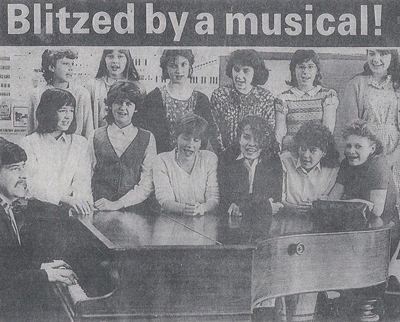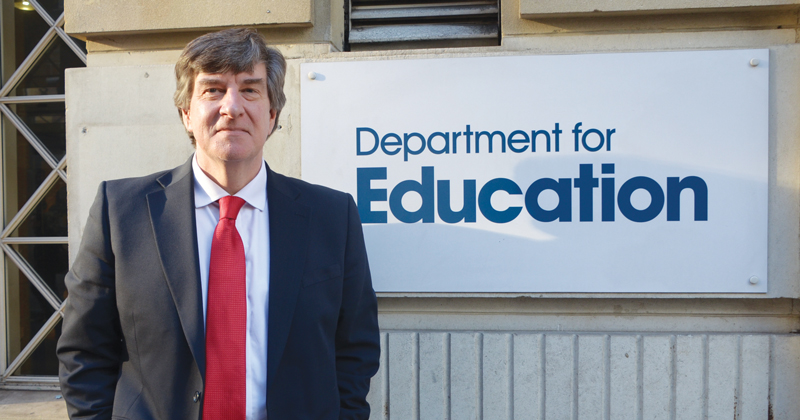It’s been an 11-month wait for an interview with David Carter, the lead kingmaker in the new world of education.
Since Schools Week started we’ve tracked the eight regional schools commissioners, civil servants who control all decisions on school and academy trust openings, closures and significant changes.
The national commissioner, their leader, is the most powerful.
After 11 months of pestering I have 25 minutes to find out his life story and his views on controversial policies. Hmm.
Escorted to an anonymous glass cube in a far-flung corner of the education department’s central London offices, I can see across the rows of desks that Carter is waiting. He looks a little like a detainee about to face a detective inspector, but is friendly and welcoming when I enter.
The recorder goes on. The press officer points out again that we have limited time.
Watches are calibrated. GO.
“What three words describe you at age 7?” I ask, on the presumption Aristotle really was correct to say that a boy at 7 essentially reveals the man.
Carter looks taken aback: “Erm… Busy? I think I was caring as I had two younger sisters… And enthusiastic? I threw myself into everything.”
He was at Marlborough Road junior school in Cardiff, his father was a professional musician and his family ran a butcher’s stall in Cardiff market.
From an early age he learnt piano and violin — and loved it.
By 14 he was at Llanedeyrn high school (now closed), in its second comprehensive intake.
“It was a tough school,” he says, admitting that his penchant for the violin did not typically make for strong street-cred in 1970s south Wales.
“So I got street cred from my sport — my football, rugby and my cricket. I balanced my life that way.”
By 21 he was doing a music degree at Royal Holloway and hadn’t given a moment’s thought to teaching until completing a music education module in his final year. “I completely got into it… I wanted to teach kids to play and compose.”

He signed up to a PGCE at the Institute of Education and completed his training in London before taking a post in a school in Canterbury, which he believed was a borough in south London. It is 58 miles away.
“I remember going to the interview and thinking, ‘This is a really long train ride!’. But I got offered the job, so stayed for two years”.
He quickly cycled through promotions until, aged 35, he took a deputy headship at Cirencester Deer Park school, in Gloucestershire. Only things didn’t go to plan.
“I rocked up and at the end of my first week the head announced he was taking a post abroad. There were two deputies. Me, who had been there a week. And my colleague, who was about to go on maternity leave. By September I was head.”
How did he feel about the sudden promotion?

He stops for a second before smiling broadly: “Errr… busy, caring, enthusiastic?
“To be blunt, at Easter I had been a head of performing arts. So… I just built a really strong group around me that would help me.”
What advice does he have for people who find themselves in the same situation?
“Be visible. You’re only going to get more worried if you stay in your office. Get out around the school. Work with your staff, work with the kids. It wasn’t a hardship to go do lunch duty every day. I’d go and play football with the kids and referee their matches.
“If you’re going to love this job you’ve got to remind yourself why you do it. Being with the kids and staff was a very big part of that.”
His style of management hasn’t changed now he presides over every academy in England. Later in the afternoon he is heading to a conference where delegates already know the presentation he will give, having seen it at his regional roadshows, briefings, keynote speeches. Yet he delivers it every time with the same zeal that the best English teachers can deliver Of Mice and Men to another new year group, despite having taught it every year for three decades.
“I have loved it!” he says, when asked about his job.
“I’ve never had to read so much stuff in my life, but I do it because I need to be well briefed. It’s political, and I enjoy the challenge of working in this environment. The thing I enjoy the most is the test of whether or not I can make it work.”
This is where I know we are going to start to butt heads. We circle the transition into policy questions carefully.
Carter explains he wants to deliver “harder messages” to the sector. How so?
You have to make sure you work first for your kids already in the school
“Well, about standards … it is an area where sometimes we think if we share some best practice, that’s good enough and it’s not…”
From this term, academy trusts are subjected to so-called “health checks” in which commissioners will check whether or not they have the capacity to take on more schools.
“You have to make sure you work first for your kids already in the school,” Carter says, needling trusts that have sometimes expanded before they were ready.
Now, he says, this doesn’t happen. Commissioners looking at new trusts see if it has a serious plan for helping its schools to improve, alongside others.
So, how big could a trust get?
“Our largest trust at the moment is AET with 66 academies. If REAch2 is successful in opening the free schools it is approved to, it will overtake that, but REAch2 has created a really strong leadership model and really strong governance model — it has a school improvement strategy that goes within and across its regions.”
There is a beat.
“I’m not saying you ever approve them to 150, but I am relaxed about them growing to 80 when I know they have got the structures right.”
More interesting for him are the growing number of “mentor MATs” in which a more established trust works with a smaller group, perhaps sharing back-room functions while the smaller trust gets financially stable.
How big can a trust get? I am relaxed if they reach about 80
“Super-MATs” also cannot be ruled out, he says, in which a larger academy trust sucks in one or more smaller trusts via a merger — indeed, several of these have been agreed in the past few months.
Would commissioners ever step in to break up a trust if it became a monopoly in an area?
“I think [monopolies] are a risk,” he says, nodding. “I remember feeling very strongly when I was doing the south west regional commissioner job that in some areas where there was only one option, we were kind of creating the risk that could happen.”
He reveals that when he was leading the Cabot Learning Federation, a medium-sized trust, he sometimes advised the board to turn down taking on new schools to avoid such a situation.
“I suppose the other side of the argument is, if the trust is really, really good at improving standards, you back parents who say ‘this is good for my kid’. You’ve probably got to get he balance right between what’s good for the school and the children, versus parent choice.”

Clock ticking, and the final 10 minutes looming, it is time to approach transparency.
Regional commissioners are unusual for having a power directly delegated from an elected politician and yet to have no requirement to hold their meetings in public — as would be expected of a local council, or local health commissioners.
The meetings in which they make decisions about schools, advised by members of their “headteacher boards”, are held in secret, with no advance notice of decisions made and scant minutes published months later. No justification of final outcomes is ever made public.
Carter doesn’t flinch.
He feels the meetings must be private so advisers can be critical about trusts and honest about reasons for turning down requests to take over a school.
“If we were open about why we said no — and it’s the no answers that would be a problem — there is a danger that people wouldn’t come forward and wouldn’t run the risk of taking on difficult schools.”
If we were open about why we said no… there is a danger that people wouldn’t come forward and wouldn’t run the risk of taking on difficult schools
More detailed feedback is given to schools and trusts making applications, he says. “And there are lots of examples of decisions that have been revisited two or three times to help people to get to where they want to.”
If we want evidence, however, we are going to have to wait some time.
We move to a final point of contention: conflicts of interest.
From January, regional commissioners will have funds to buy improvement services for under-performing academies. But this means commissioners will be responsible for deciding a school is not doing well, picking and paying for someone to improve it and then judging its effectiveness. How can we expect them to be impartial in the final judgment when they have been so involved in the first two parts?
This is precisely the sort of problem Ofsted ran into when it tried to do school improvement, and is the sort of conflict that local authorities were accused of when politicians pushed the academy model in the first place.
So why do it?
Carter’s first answer is wishy-washy. There is lots of chat about “visible strategy leaders” and something around bringing in teaching schools, and holding them accountable, and “diagnosis and analysis”.
It is unconvincing and long-winded. Why spend so much effort trying to hold loads of people accountable? Why not just give a school six months to sort itself out and rebroker it if it can’t?

For a second, he is skewered. But his second answer is sharper. And sort of brilliant.
“I worry that if you jump to rebrokerage as your first and only solution, and I’ve overseen a number of those as you’d expect, then it is incredibly distracting and really destructive to a school. And the people who feel it the most are the staff and the kids. The leaders and the governors — those who have failed — actually, they get out of the situation. But the school continues. We have to look at how we give the school an opportunity to improve quickly without having to rip the whole thing apart.
“From day one schools need to be aware, and they are made aware, that whether they are a single or multi-academy trust, the end point will be rebrokerage. But I would worry if our default was to go straight to that.”
From day one schools need to be aware … that the end point will be rebrokerage
Somewhere a local authority worker scratches their head asking why all failing non-academies haven’t been treated this way. But it’s a fair point.
To hammer this home, Carter gives an example of a trust he is working with where pupil standards are high, but there are serious issues in finance, leadership and governance.
“I’m not sure that saying that ‘by Easter you are going to be in another trust’ is the right answer. Maybe what we do is leave the school where it is and bring in new trustees and leadership to put right the things that have gone wrong.”
I’m sold and want to ask him so much more: how do we solve isolated MATs, how do we encourage new trusts to open in the north, which is the best sport, cricket, football or rugby?
But it is midday, and like a diurnal Cinderella, Carter is away. Our 25 minutes is over.
As I leave the building I wonder why it has taken 11 months for such an interview. If Santa brings anything to the DfE this Christmas I hope it will be the wisdom to let him speak more often and openly. He can certainly handle it.
__________________________________________________________
It’s a personal thing
What is your favourite film?
The Italian Job — the original with Michael Caine.
If you were invisible for a day what would you do?
Play centre forward for Cardiff City, no one can see me, I score a hat trick.
What was your favourite toy as a child?
A Subbuteo football game. I played it virtually every day between the ages of 11 and 14.
Which animal are you most like?
A Welsh dragon.
If you were given billboards across the country, what slogan would you write on them?
Life is not a rehearsal. Live every day as if it were your last. Having lost my sister when she was way too young, this really resonates.
What do you eat for breakfast?
Fruit ‘n Fibre with Greek yoghurt.














Don’t get too impressed too quickly. Schools need stable populations, stable curricula, stable assessment, stable finances. There aren’t enough quality surfers like Carter around, capable of staying atop the turbulence, and anyway all surfers end up beached! Back in the day, we had both great LEAs and worse. Where LEAS scored was geographical proximity, and a musketeer approach of all for etc.
On the cusp of 2017, we are in the worst of all situations for the state sector. ALL-R are i/c, everything has just been changed, and post levels and A*-G for GCSE, modules gone linear, new boat – on anything that covers the gaps we have, and an international community of educators looking at what we are doing with a look in the style of Munch’s scream. Look what Gove, Morgan and Greening have done/are doing and weep; their violent and incoherent turbulent activity around education means changes are being made so quickly, nothing is anchored to common-sense bedrock, and the outcome will be a profession shorn of existing staff and so badly under recruited for the next generation, we’ll have to accept anything leading in the classroom so long as they has a pulse. Bit I like least; approving a lack of transparency of trust decision making.
There is a difference between allowing private space for challenging conversations to take place away from public gaze and a complete absence of transparency and accountability. These decisions involve large sums of public money and matters over which parents,staff and the wider public have very legitimate interest and yet nobody can see how or why decisions are being made. The minutes of the Headteacher Boards are either cryptic or a cut and paste job with the same discussion points for every single decision. It’s time there was proper governance of the RSC structure and decision-making. And a proper protocol for respectful professional relationships between RSCs and DCS’s whose roles should be complementary not adversarial or dismissive.